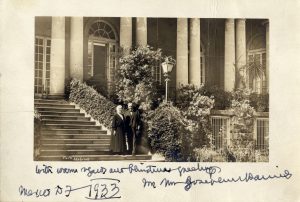
“At 79, famed Tarheel Editor Josephus Daniels last week staged a spry comeback on his lively, incomplete, partisan, aggressive, successful Raleigh News & Observer. After a nine-year absence (as Ambassador to Mexico) shrewd old ‘Uncle Joe’ Daniels had ‘enlisted for the war’ to replace his son Jonathan, who went to OCD [Office of Civil Defense] in Washington.
“By contrast to his smart, facile son Jonathan, wrinkled old Editor Daniels, in his black planter’s hat and elder-statesman tie, was a figure who easily evoked oldtime reminiscences. A full-fledged editor at 18, he had tangled in many a garrulous crusade against North Carolina railroads, tobacco and power companies. Great pal of William Jennings Bryan (of whom he wrote an 8,000-word obituary in six hours) and a hard-shelled Dry, he banned liquor on Navy ships.
“Last week Editor Daniels added a commentary on his Navy days: ‘Even when I was “absent without leave” from the sanctum during the eight years as Secretary of the Navy in the Woodrow Wilson administration,’ chuckled old Josephus, ‘I thought of myself as managing editor of the Navy rather than as a Cabinet official.’ ”
— From Time magazine, February 16, 1942
Time certainly went into adjectival high gear for the Danielses and their newspaper, but where’s the imagination in referring to Josephus as “old” three times in three paragraphs?
Pictured: Josephus and Addie Daniels on one of their annual photo Christmas cards.

